#spiritual not religious
Text
By: Ryan Burge
Published: 26 Jan, 2024
One of the most challenging aspects of this job appears simple to those who haven't done it before: crafting survey questions. It’s such an impossible task, especially when you are trying to develop new measures that haven’t been used before in other surveys. To put this in some context, I met with a team of three graduate assistants every other week for an hour for the entire Fall semester just to get a survey in shape to be rolled out to a select group of early reviewers. Sending out that first draft is nerve-wracking because you know that many aspects won't work and will need adjustments or removal. It's akin to typing into a Google Doc, and a collaborator logs in, leaving you feeling vulnerable.
Over Christmas break, I had sent the test link out to some folks that I really trust and I know that they will provide some excellent feedback. I was not disappointed. Our research team met earlier this week to review the feedback and make some changes; we all agreed that this moved us closer to a finished product.
But there’s one comment that I received that I have been thinking about a lot. There's a section of the survey that inquires about spirituality and spiritual practices. Most reviewers had the same critique: they wished for a clear definition of spirituality within the survey. I get that impulse. I really do. But, I don’t think I’m going to be able to do that for a simple reason:
I don’t know that our team could write a definition of spirituality that most people would agree with. It’s very much “in the eye of the beholder.”
However, I may actually understand spirituality a bit better now thanks to some recent data posted on the Association of Religion Data Archives (ARDA) that was funded by the Fetzer Institute. The National Religion and Spirituality Survey, conducted in late 2022 with a total sample size of 3,651, provided valuable insights into how people perceive the words 'religious' and 'spiritual’.
I know it’s a cliche when I write this, but in this case it’s true: I honestly understand the world a little bit better after doing this data work. It absolutely sharpens my understanding of the religious/spiritual world and how the average person relates to both those concepts.
There was a question battery at the beginning of the survey that listed a whole bunch of terms (13 in total) and folks were asked if that word described spirituality to them. Then they were given the same list of terms and asked if those described religion to them. It offers a peek behind the curtain of how these words are understood in the general population.
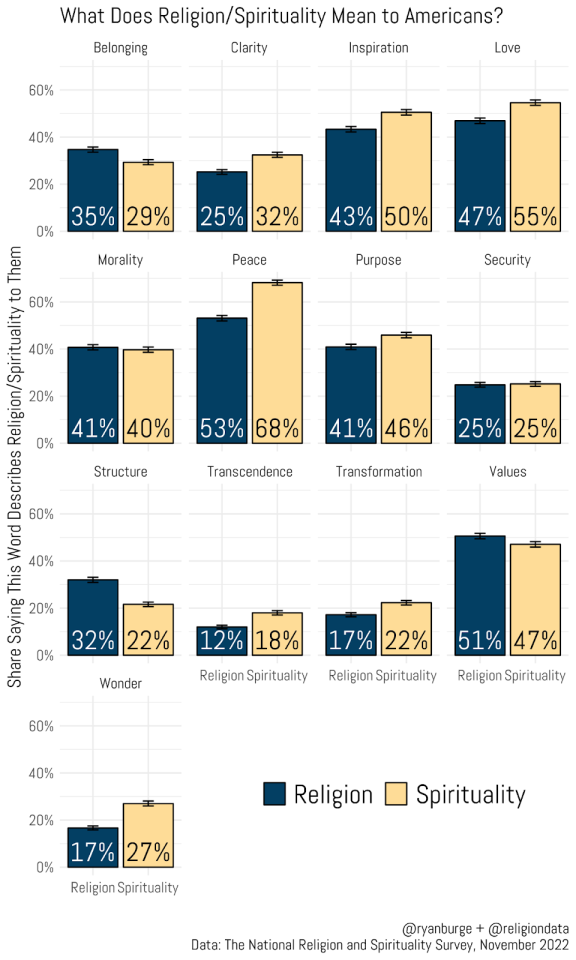
The general consensus that emerges is that people tend to associate many words with spirituality, but fewer terms describe religion. For example, eight of these terms clearly describe spirituality more than they describe religion: clarity, inspiration, love, peace, purpose, transcendence, transformation, and wonder. And in many cases the percentage difference between religion and spirituality is pretty large. It’s thirteen points for peace (68% vs 53%). It’s eight points for love (55% vs 47%) and seven points for inspiration and clarity. The most chosen terms here are peace, love, and inspiration.
In contrast, there are only a few terms clearly associated with religion: belonging (35% vs. 29%), structure (32% vs. 22%), and values (51% vs. 47%). Eight for spirituality and three for religion. The words that are most likely to be associated with religion are peace, values, and love. Only 17% of folks say that transformation and wonder describe religion, just 12% say that transcendence is a part of religion. I feel like there’s an entire dissertation to be written about that.
But how do religion and spirituality work together? Folks were asked, “How spiritual are you?” and then were asked, “How religious are you?” They were given four response options ranging from “not at all” to “very.” What I think is fascinating is the result when you put those two questions into a heat map.

Just 9% of the population identified as both very religious and very spiritual. The most common response was that they were both moderately spiritual and moderately religious, with 23% in that category. In contrast, 12% of the sample said that they were not at all religious and not at all spiritual. Clearly the diagonal line across the middle of the heat map was where most people found themselves - these four squares represent 56% of the sample.
Only .2% of folks said that they were very religious but not at all spiritual. In contrast, 3.2% were very spiritual but not at all religious. One throughline that I see is that there are lots of people who are not religious but somewhat spiritual, but the opposite is much less prevalent. Almost everyone who says that they are religious also says that they are moderately or very spiritual. It’s almost like spirituality doesn’t need religion but spirituality is an essential part of religion.
One question I had when I started looking through these questions was: are young people more likely to embrace spirituality and reject religion? And are older folks more attracted to religion and less to spirituality? There’s a decent sample size here so I can answer these questions.
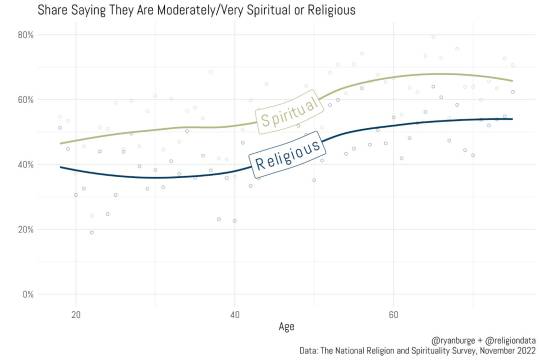
Among the youngest adults, slightly less than half claimed to be moderately or very spiritual, while the share for religion was about ten percentage points lower. These trends remained relatively stable from ages 18 to 40, with a persistent ten-point gap. But then both lines began to slowly drift upwards among those in their forties and fifties. The share who say that they are moderately/very spiritual moves up to about 50% around 50 years old. There’s also an upward movement among those who say the same about religion.
But then the lines basically flatten off again - from 55 years old all the way to 75 years old. Even among the oldest Americans, spirituality is embraced more than religion. Among those who are 70 years old about two-thirds say that they are moderately/very spiritual and around 55% say they are moderately/very religious. So, spirituality is clearly more popular across the board. And it’s really fascinating how that gap is basically the same size across the entire age spectrum.
I wanted to end this piece by analyzing a series of questions about whether spirituality or religion has any bearing on how people act in the real world. For instance, folks were asked how much they agreed with this statement, “My <Religion or Spirituality> Impacts My Political Views.” Response options ranged from strongly disagree to strongly agree.
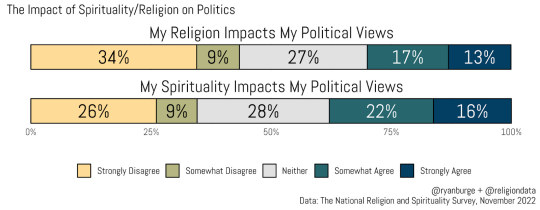
Just 13% of people strongly agreed that religion impacted their political views, while it was 16% for spirituality. Thirty-eight percent agreed that spirituality influenced their political views, compared to 30% for religion. Folks were 21 points more likely to strongly disagree with the statement “religion impacts my political views” than strongly agree. That’s not a small difference. For the spirituality question the difference was only ten points (26% vs 16%).
But, how about their political activity like protesting, attending campaign events, etc? The same kind of gaps emerge here, too.
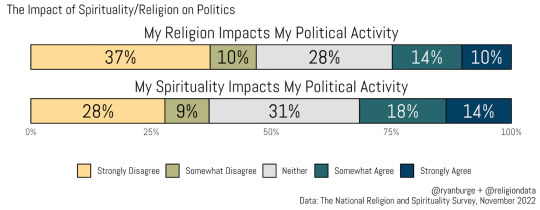
The most common response for the statement, 'My Religion Impacts My Political Activity,' was strongly disagree at 37%, with only 10% strongly agreeing. In total, people were twice as likely to disagree as to agree (47% vs 24%). Spirituality fares just a bit better. Nearly a third of the sample agreed that their spirituality impacted their political activity while 37% disagreed. But big chunks of the sample neither agreed nor disagreed with each statement. It just doesn’t feel like religion or spirituality are motivating folks to get engaged in the political process.
I wanted to show you all one more question that used this format, but this time it was the impact of spirituality or religion on civic engagement which is activities like volunteering their time for a nonprofit or donating to charity.
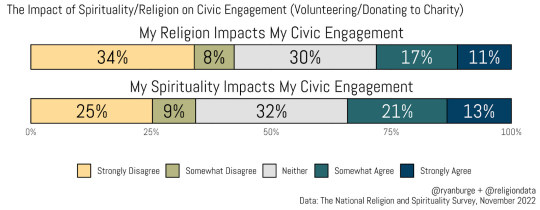
Again, a similar pattern emerges, with spirituality driving civic engagement more than religion. In terms of religion, 28% said it drove their civic engagement, while for spirituality, it was 34%. A third of the sample strongly disagreed that religion drove their volunteerism, it was only 25% who said the same thing about their spirituality. Across the board, it’s spirituality that seems to be doing more work than religion.
There’s a belief out there that spirituality tends to be more selfish than religion. For instance, things like meditation and yoga are more individualistic practices. Meanwhile, religious practices (especially corporate worship) are outwardly focused toward engaging not only with the rest of the religious body but also the community at large.
But in a great paper published in 2022, Jaime Kucinskas and Evan Stewart tested this hypothesis and what they found largely comports with what I just showed you in the last three graphs. Spirituality is not necessarily selfish. Instead, they argue for what they call, “substituting spirituality.” They describe it this way, “spiritual practice (works) as a substitute for religious engagement among groups alienated from religious institutions, with the former capable of fostering similar proclivities for political action as the latter.”
I think almost everyone in the United States has heard the term Religious Right, but that seems to be anachronistic given the changing spiritual landscape of the 21st century. It’s not religion that drives political engagement, it’s spirituality.
==
An obvious question needs to be, "what is the point of religion, then?"
#Ryan Burge#religion#spiritual#spirituality#spiritual not religious#atheism#religion is a mental illness
3 notes
·
View notes
Text
When we ask to be Held, we Are.
🪽
Encountering The Sacred as compassionate space-holder fills me to the brim every time They remind me to just sink back.
🪽
The Seasonal Wheel turns: we transition, transform, expand, contract. Personally, I can feel myself slowing down (even more). And I am reminded: “You are held. You are home.” And so it is.
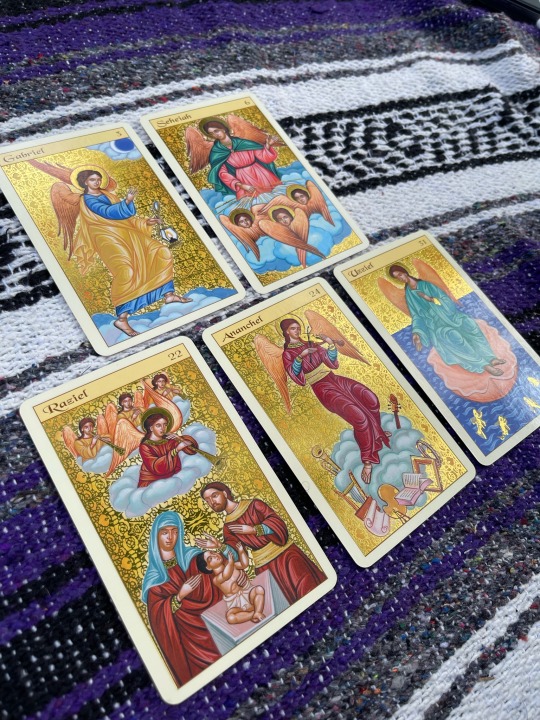
#angelcore#angelic healing#tarotblr#tarot#oracle#spiritual not religious#spiritualjourney#spiritual direction
0 notes
Text
Hey folks. You know how that myth that abusers are all people who don't care about their victims at all keeps people stuck in abusive situations, because the person they're being abused by doesn't match the description of the complete monster they're told an abuser is?
Okay. Now I need you to understand that saying "X shitty religious group doesn't actually care about people, it only wants to control them" is harmful for the exact same reason. This kind of thinking will keep people trapped in harmful forms of spirituality longer because they won't recognize that just because their spiritual leaders and mentors genuinely care, doesn't mean they aren't also behaving abusively or harmfully.
2K notes
·
View notes
Text
To all the people that think I'm lazy here's one no two fingers!
🖕🏾🖕🏾
Try and stay active with mental emotional and physical issues every day with the only thing keeping you up is Spiritual.
Thank you for the spiritual.
0 notes
Text
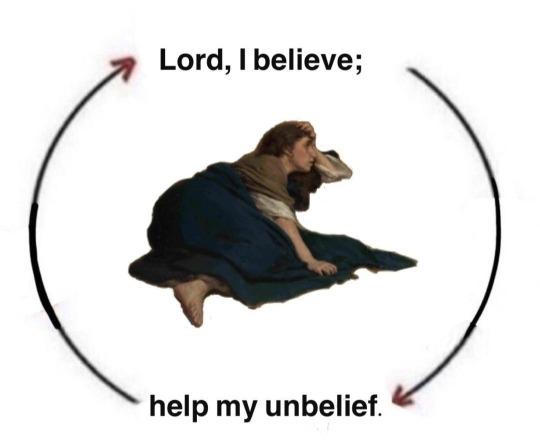
endless cycle
#christianity#christian blog#spirituality#catholic#christian faith#theology#catholiscism#christian femininity#christian memes#catholic aesthetic#catholic memes#spiritual memes#religious guilt
3K notes
·
View notes
Text
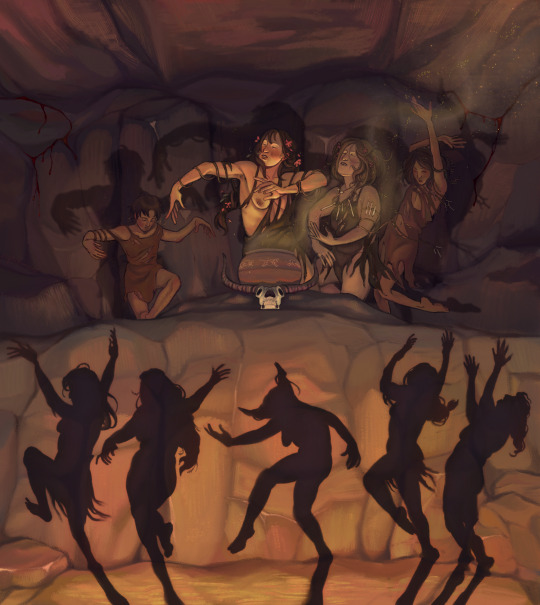
pathologic fest day 19
"In the Darkness"
where nobody dwells but the earth herself
#pathologic#pathologic 2#herb brides#pathologic_fest#моросентябрь#pathologic fest#мор утопия#nonsexual nudity /#my art#i STAY herbbridesposting......... having a blast#fun fact this one's been in my WIPs for months now#and getting to finish it because it fit the theme so well.... blissful#herb brides can have a little Pythia moment... as a treat#can't believe i have to do this /!\ THIS IS NOT DIONYSOS-RELATED. THOSE ARE NOT MAENADS. THOSE ARE FICTIONAL MEMBERS#OF A FICTIONAL CENTRAL ASIAN-INSPIRED PEOPLE PARTAKING IN MOTHER-EARTH WORSHIP WITHIN A FICTIONAL#CENTRAL-ASIAN INSPIRED SPIRITUALITY. /!\#/!\ THEY WORSHIP AN ALL-MOTHER EARTH-GODDESS WHOSE PROGENY IS THE ENTIRE WORLD AND NOT A MALE GOD OF WINE PASSION THEATRE [...] /!\#/!\ THE OP HAS PERSONAL AND INTIMATE SPIRITUAL/RELIGIOUS BELIEFS AND WOULD NEVER MAKE DEVOTIONAL ART TO A MALE GOD /!\#this would be my portfolio tag if i had a portfolio [portfolio tag]
2K notes
·
View notes
Text
#Identity#family dynamics#family#parents#children#gender#Alterhuman#otherkin#therian#otherhearted#spiritual#religious#problematic#cringe#polls on tumblr#my polls#polls#random polls#tumblr polls#random poll#poll time#silly guy
371 notes
·
View notes
Text






Because I live, you will also live.
John 14:19
#Catholic#orthodox#christianity#moodboard#art#gothic#aesthetic#light academia#religious imagery#religious art#philosophy#quotes#bible quote#bible verse#god#Jesus#architecture#photography#poetry#catholic academia#light catholic#churchcore#cathedral#faith#prayer#spirituality
306 notes
·
View notes
Text
hey so do you guys remember how zuko was deemed worthy and blessed with the true nature of fire by the guardians of light themselves and became 100x the firebender he was after, with a newfound understanding and oneness with his element
kind of like how katara handled the moon and ocean spirit with her own hands and was blessed with unmatched waterbending power and oneness with her element and also spirit water but get this, also the healing ability to bring someone back from certain death
y'all remember that
#zutara#the parallels never end#i 100% hc that katara was blessed singularly by the spirits and that is why she went from struggling to THRIVING in her mastery#able to bloodbend on her first try ffs#katara and zuko have a degree if spirituality that a@ng ironically does not have. he is religious#but they are spiritual#and take bending seriously as a sacred gift not meant to be raken lightly#unlike someone
456 notes
·
View notes
Text

Noah's Ark
Artist: Edward Hicks (American, 1780 -1849)
Genre: Religious Art
Date Created: 1846
Medium: Oil on Canvas
Collection: Philadelphia Museum of Art, Philadelphia Pennsylvania
Description
The biblical story of Noah’s ark, depicted here, is found in the book of Genesis (6:9–9:28). To punish people for their wicked and violent ways, God decided to send heavy rains to earth for forty days and forty nights. First, however, he instructed Noah, a righteous man, to build an ark for his family and two of every kind of animal. After the rains stopped, a dove sent out by Noah returned to the ark with an olive branch, proof that the floodwater had receded and plants could grow again. Then God created a beautiful rainbow in the sky as a symbol of his promise to never destroy the earth again.
This painting by Edward Hicks shows a long, curving line of animals approaching Noah’s huge boat. Prancing horses and a serious-looking lion stare out at us, while pairs of elegant, black-and-white-striped zebras, giraffes, camels, tigers, and hippopotamuses stand patiently. In the distance, tiny black birds fly down from the dark, rain-filled clouds overhead.
Edward Hicks learned to paint decorative motifs when he was apprenticed to a coach maker at the age of thirteen. Later he became a successful sign painter and a devout Quaker preacher. Although his business conflicted with Quaker beliefs-that art is a distraction and a needless luxury-Hicks considered his art to be an expression of his faith and created paintings that told religious stories. This is the only painting he made of the story of Noah’s ark.
#edward hicks#american art#religious art#philadelphia museum of art#animals#horses#wildlife#ship#religion and spirituality#folk art#19th century art#storms#rain#sheep#christianity#zebras#lions#philadelphia artist
290 notes
·
View notes
Text
One advice I can give to new/young pagans today is that any religion that demands 100% of your time, energy, commitment, and devotion is a cult, pagan or not, so don't fall for that.
256 notes
·
View notes
Text
PSA: If you're searching out resources to help cult survivors, check their citations and look out for these names - and if you see them, leave immediately - because these people are all far right conspiracy theorists:
Svali
Cisco Wheeler
Fritz Springmeier
Cathy O'Brien
Mark Philips
Lawrence Pazder
Michelle Smith/Pazder
Lauren Stratford
Texe Marrs
Bill Schnoebelen
Rebecca Brown
Mike Warnke
Literally all of these people were (or in some cases, still are) pushing far right conspiracy theories derived from early modern witch panic, blood libel, and The Protocols of the Learned Elders of Zion. Literally do not trust anyone or anything that cites them.
#religion#spirituality#religious trauma#religious abuse#spiritual abuse#cults#cult survivor#cult recovery#conspiracy theories#conspiracy theory#conspiracism#conspiracy theorists#witchblr#paganblr#red flag#red flags
845 notes
·
View notes
Text
Opposition will cause you anxiety. Think not about the polar opposites of a situation (the risk versus the reward) think about what you're gaining just by 'trying'. The universe sees effort as an opportunity to give back to you so when you may feel down, neglected or rejected worry not because if you have been putting positivity into the earth [and I believe you have) then they will return you with an outpouring of love and blessings. I am not religious. I am spiritual. And spiritual is not a religion it as a being, an understand that we are all spirits. Even and especially plants and animals. So treat things with respect and the universe will do the same for, with, by you. #respectthegroundyouwalkon #lawofattraction #thelawoftheland #respectbegatstrespect
#respect#society#universe#immortal universe#my thoughts#spirituality#spiritualism#spiritual not religious#not religious#spiritualguidance#spiritualhealing#spiritualpath
0 notes
Text

magdalena by emma pastor normann
#spirituality#catholic#theology#catholiscism#catholic art#christian art#religious art#saint art#mary magdalene
807 notes
·
View notes
Text
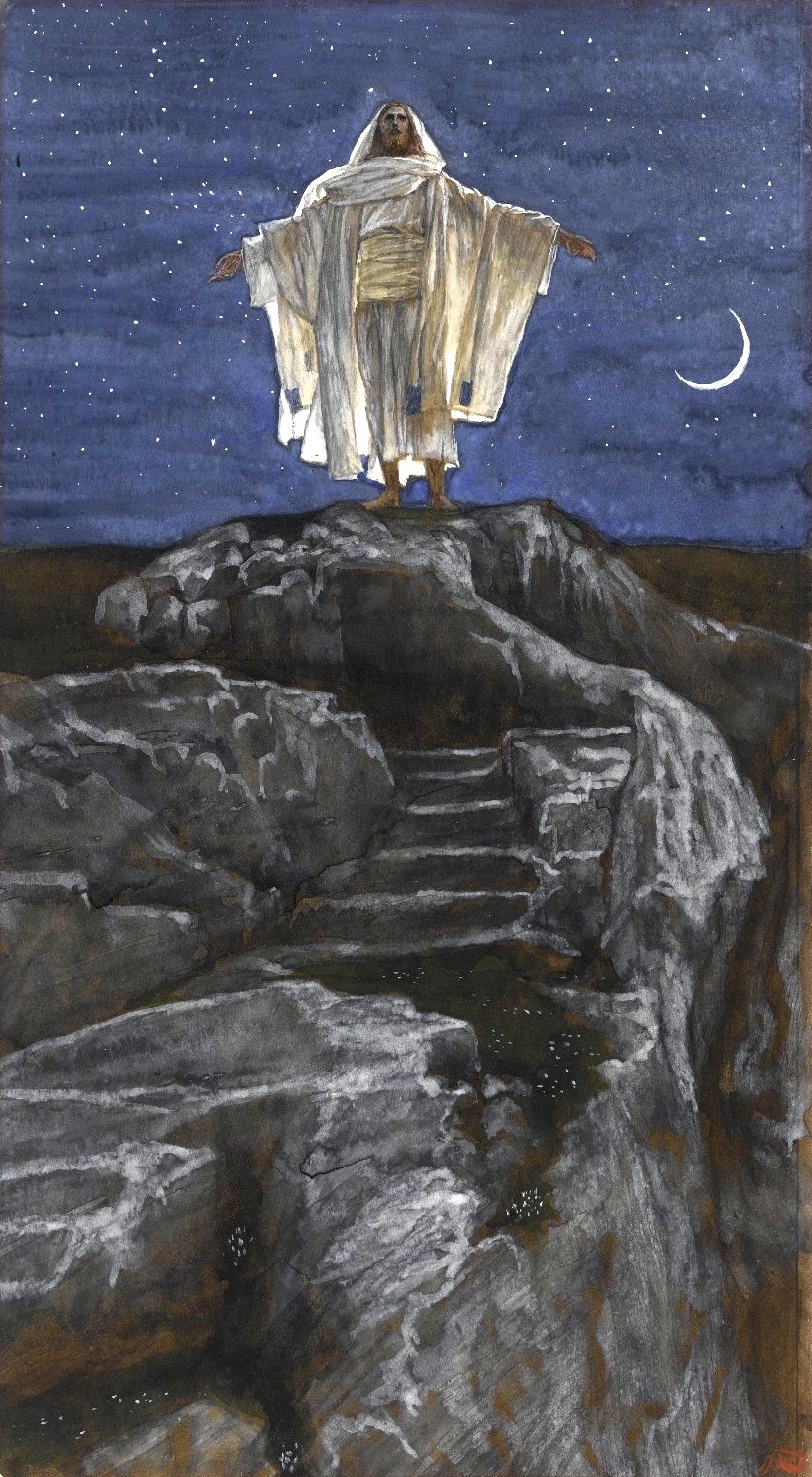
Jesus Goes Up Alone onto a Mountain to Pray by James Tissot
#jesus#christ#jesus christ#art#james tissot#prayer#pray#mountain#christian#christianity#religion#religious#sky#stars#moon#crescent moon#symbolism#religious art#jerusalem#biblical#bible#spiritual#europe#european
363 notes
·
View notes
Text
Cult survivors deserve peace. Cult survivors deserve safety. Cult survivors deserve happiness.
#and yes this includes you#ex cult#cult survivor#cult#cults#religious abuse#religious trauma#organized abuse#spiritual abuse#ramcoa#ptsd#cptsd#recovery#cult recovery#trauma#trauma recovery#positivity#healing#trauma healing
243 notes
·
View notes